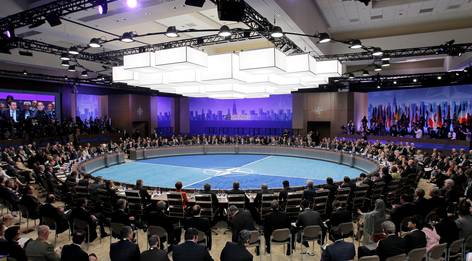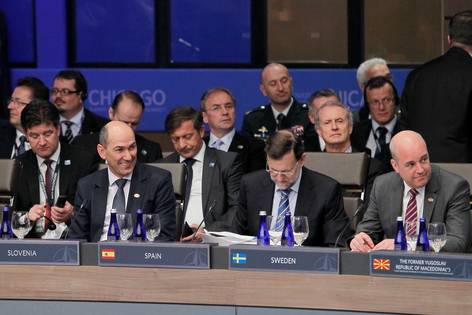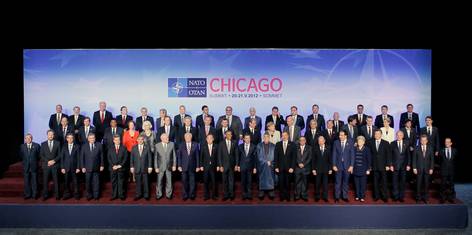NEWS
Prime Minister Janez Janša: "Our own national security is better and much less costly within the North Atlantic Alliance".
The NATO Summit, which is being attended by a Slovenian delegation headed by the Slovenian Prime Minister, Janez Janša, will conclude today with working sessions at which the heads of delegation mainly discussed the NATO operation in Afghanistan, and the role to be played by NATO going forward. In the Chicago Summit Declaration on Afghanistan, the Heads of State and Government of NATO's member states confirmed that the alliance troops participating in the ISAF operation would withdraw from Afghanistan by the end of 2014, whereas the responsibility for combat operations would be handed over to Afghan forces in the middle of the following year.
Following these meetings, the Slovenian Prime Minister stressed that this year's summit had turned out to be more important than initially expected. "Here, two aspects are of particular significance. The first is related to the reorganisation of NATO at a time when NATO member states and most of the rest of the developed world are affected by the economic crisis. A number of decisions have been devoted to the issue of how to provide an equivalent or better level of security and defence at a lower cost; in this regard, the harmonisation of the Declaration is an important step forward," he said.
Prime Minister Janez Janša went on to say that the meeting which takes a partnership format involving those participating in the NATO operation in Afghanistan, was NATO's largest ever summit by far. The summit was also important for a "mid-term evaluation of the operation's progress, with NATO being the focus, and is a kind of model operation for the international community, which, following the withdrawal of NATO troops, it seems for now will continue with the steps necessary to ensure that the efforts invested would not be wasted, and that the achievements and developments in Afghanistan would be permanent".
According to the Prime Minister, cooperation between NATO and the international community will probably serve as a model for many of the international activities that will be conducted after the operation in Afghanistan. The Prime Minister believes that the reasons why this action sets an example for others in the future lie in the fact that the mission in Afghanistan concerns a high degree of coordination, timely planning after the action has been carried out, and the provision of the financial means required to ensure that the positive changes made remain permanent.
"Today, when we evaluate the NATO operation in Afghanistan, we are talking about something that in the future will not only be limited to the direct impact on Afghanistan and its immediate proximity, but also to an experiment – a method which presents new opportunities and ensures the international community reacts to a crisis situation in any part of the world, and not just in the Euro-Atlantic area," the Prime Minister opined. In his view, NATO's meeting with its partner states is of utmost importance, since it represents a follow-up to "NATO's new strategic role, which will be entirely different from the role played by NATO during the Cold War".
Prime Minister Janez Janša took the view that, after 2014, Afghanistan would undergo a period during which stability is to be consolidated, and that this would require considerable investment. "Thus, various international organisations, as well as countries that currently work together within the framework of partnership with NATO in Afghanistan, will continue maintain their presence there," the Prime Minister confirmed. He also added that Slovenia would help to the best of its ability in the consolidation of democratic standards, transparency and economic development. "NATO will maintain its "advisory role" to the Afghan National Security Forces; in 2014, military operations will be concluded and the Afghan forces, which have been the recipients of words of praise from senior sources, will assume full responsibility for security in the country," the Prime Minister explained. He pointed out that both an international and military presence in Afghanistan would remain a fact of life; however, this presence would be "based on bilateral agreements between sovereign states, and the military presence would no longer be based on the UN resolution which limits the sovereignty of the state in which the action takes place."
In the Prime Minister's words, this summit is also important for Slovenia because of the direction adopted together with the "Smart Defence" initiative, and other activities related to rationalisation, and is focused on taking the actual economic situation into account, and at this time does not currently impose the obligation to achieve, at all costs, the target of 2% of GDP on defence. "Our decision to apply the same level of security by using our reserves is crucial," he said.
"On the basis of the declaration adopted at the summit, and on the basis of the discussions held and conclusions reached for the future, Slovenia may believe with great confidence that its own national security can be better ensured, at considerably less cost, and within the framework of the North-Atlantic Alliance," the Prime Minister said. He noted that Slovenia, on the other hand, can offer the experience and capabilities in which it excels to the alliance.
According to the Prime Minister, Slovenia is one of the few member states at the NATO Summit that strongly supported the fact that NATO's open-door policy should not be neglected when establishing broader partnerships, or when NATO becomes a global tool for ensuring world peace and security. "In terms of the geographical aspect of the security of the region in or near to which Slovenia is located, this is very important," the Prime Minister confirmed. "Upon our insistence and the insistence of some other member states, the Summit Declaration states that the open door policy is a key priority, and specifically defines the Alliance's stance towards candidate countries," the Prime Minister added.
In his statement to the Slovenian press on the margins of the Chicago NATO Summit, the Prime Minister also commented on yesterday's election in Serbia. In his words, "we do not expect significant changes in the country's foreign policy. The European Union is the only real perspective, which is why we were glad to hear the pro-European statement made by Serbian President Tomislav Nikolić". According to the Prime Minister, Tomislav Nikolić's election as Serbian President echoed in the European part of NATO; the election was considered somewhat unexpected but will not bring about significant changes in EU-Serbian relations. "The election may be more relevant in terms of internal political changes while, from a pro-European perspective, no essential changes are expected; maybe the steps to be taken will even be stepped up," the Prime Minister concluded.
After the NATO Summit's closing sessions, most of the delegation will return to Slovenia, but Defence Minister Aleš Hojs and Ambassador Roman Kirn will instead pay a visit to Slovenian soldiers in Colorado Springs and the Colorado National Guard in Denver.









